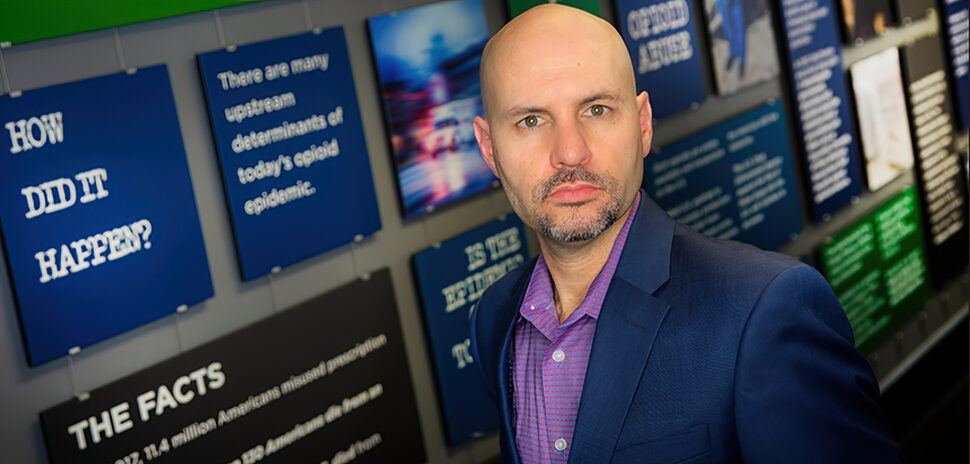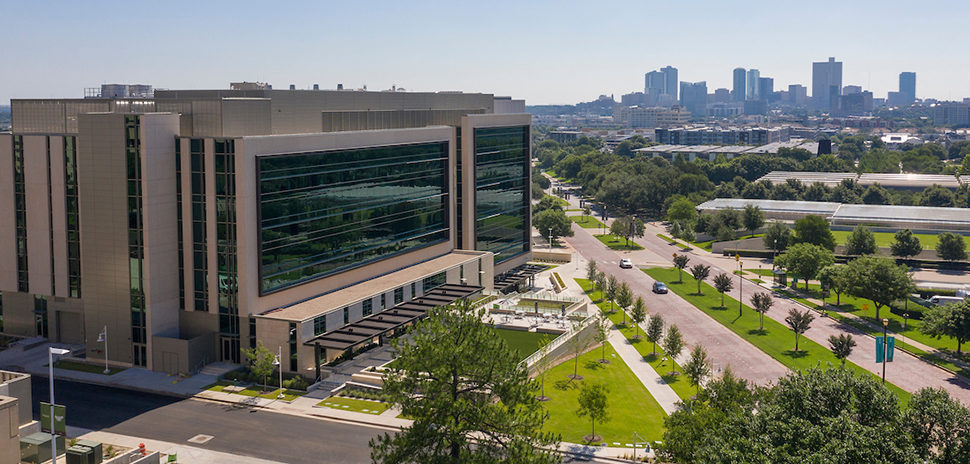The healthcare industry is facing a critical shortage of workers in 2026, and the University of St. Augustine for Health Sciences is taking action to equip more students with the skills and knowledge to become top healthcare professionals
The private university, which opened a North Texas campus in 2019, is expanding after a relocation to a larger facility in Irving earlier this year. The new campus at 901 West Walnut Hill Lane in Las Colinas, is 3.5 miles northwest of the school’s former 33,869 square-feet location at Riverside Commons.
The new space has 55,050 square feet of classroom, laboratory, and administrative space in a building that was redeveloped by Coppell-based Vari. The building previously served as the longtime headquarters for Zale Corp.
A second phase of the project will add another 20,979 square feet to the campus by August 2024, the university said.
Besides Irving-Las Colinas, the university has campuses in San Marcos, California, St. Augustine, Miami, Florida, and Austin. The accredited, graduate-level university founded in 1979 focuses on health and rehabilitative sciences through innovative classroom and clinical education.

USAHS’ new campus is located at VariSpace Las Colinas, the former Zales headquarters building in Irving.
Meeting a rising demand for healthcare professionals
With its cutting-edge approach to education, the university’s leaders say the school can help meet the growing demand for next-generation healthcare professionals in Texas and beyond.
USAHS Chancellor and CEO Vivian A. Sanchez emphasizes the institution’s commitment to innovation and adaptability in addressing the changing needs of healthcare practitioners. “At USAHS, we pride ourselves on innovating and responding to the ever-changing needs of today’s healthcare practitioners,” she said.
According to Sanchez, the more than 40-year-old university’s more than 14,000 alumni have become top clinicians in the country. USAHS is committed to providing a “strong pipeline of talented healthcare professionals” for the biggest hospitals and healthcare facilities in Dallas-Fort Worth, who are ready to serve the industry’s needs today and in the future through the institution’s innovative programs, the chancellor said.
Advanced health science degrees
The Irving-Las Colinas campus opened in 2019 with its Doctor of Occupational Therapy (OTD) program, followed by the Master of Science in Speech and Language Pathology (MS-SLP) and Doctor of Physical Therapy (DPT) programs. Additional USAHS graduate programs offered online include Master of Science in Nursing, Doctor of Nursing Practice, Master of Health Administration, and Doctor of Education.
According to Dr. Ashley Bourque Meaux, the director of USAHS’s Irving-Las Colinas Campus and associate professor for the MS-SLP program, USAHS is among the first universities to have simulation education centers exclusively for the rehabilitative sciences.
“Thanks to USAHS, every graduate is uniquely prepared for long-term success as effective, interdisciplinary problem-solvers and leaders in their professions,” she said, adding that the students are able to improve their professionalism, bedside manner, patient safety, and patient care skills before their first clinical role.
Graduates are equipped to become effective, interdisciplinary problem-solvers and leaders in the healthcare industry, whether in an ICU, in-patient rehab facility, mental health clinic, or any other setting, the director says.
Meaux told Dallas Innovates that USAHS’s innovative approach to education prepares its graduates for jobs in a post-pandemic world by blending modern, interdisciplinary health sciences education with patient care and service to the community.
With “numerous community clinics and service projects” aimed at helping people with disabilities, mobility challenges due to disease, and senior citizens, USAHS is positively impacting the communities it serves, the campus director said.
Growing to meet rising demand for healthcare in Texas
Meaux says that the demand for health science practitioners is rapidly growing—particularly in Texas. Meaux said the Bureau of Labor Statistics believes that employment in healthcare is projected to grow by 16% over the next decade.
“This means that the field will add about 2.6 million new jobs to the economy, which is more than any other field. Yet, the shortage of healthcare professionals is expected to remain pronounced,” Meaux said.
She said an analysis of EMSI data found that there will be a critical shortfall of 3.2 million healthcare workers by 2026.
“And this is where I get really excited because the University of St. Augustine for Health Sciences’ new Dallas-Fort Worth campus is going to play a vital role in bringing new opportunities to students and enhancing access to qualified practitioners for the North Texas region,” Meaux said. “Establishing the University of St. Augustine for Health Sciences’ new campus in North Texas is pivotal in addressing these healthcare shortages.”
Cutting-edge edtech, from simulation laboratories to anatomage tables

[Photo: USAHS]
Meaux said that preparing students and graduates for career success in a post-pandemic world relies on the university’s success of blending modern, interdisciplinary health sciences education with a focus on unparalleled patient care and service to the community.
According to Meaux, the University of St. Augustine for Health Sciences uses innovative teaching techniques that incorporate the latest technology and emphasize practical learning experiences. And, she says, partnerships with various healthcare organizations provide students with valuable opportunities to gain real-world experience.
The simulation laboratory helps students practice patient interactions in simulated hospital and home environments. Other leading-edge edtech tools on campus include 3D printers, rehabilitation/exercise machines, driving simulators, robotics, and anatomage tables, which are the world’s first and only virtual dissection tables, the university said.
Meaux said that not only does the university provide students the opportunity to develop real-world experience and skills by giving back to the community, but they’re also exposed to a variety of programs where they can hone in on their passion in the health sciences profession.
‘Another strong economic development story’
Irving leaders lauded the new, bigger presence for the university.
“Texas is one of the fastest-growing states in the nation, but with an equally large aging population, the demand for healthcare services is high,” Irving Mayor Rick Stopfer said in a statement. “We’re thrilled the University of St. Augustine for Health Sciences is making a bigger footprint here. It’s another strong economic development story for our city, and the university will benefit from every healthcare company that is headquartered here.”
William Quinby from Savills represented USAHS in the deal.
Dallas-based architecture, design, and planning firm Gensler oversaw building upgrades, which included adding USAHS’ signature Center for Innovative Clinical Practice.
USAHS said it has been a Certified B Corp since 2015. This designation shows the university’s social responsibility and commitment to the environment. Each campus uses recycled materials, including carpet, high-efficiency HVAC systems, LED lights, water bottle refill stations, daylight harvesting, motion light sensors, low-flow toilets, and xeriscape landscaping.
![]()
Get on the list.
Dallas Innovates, every day.
Sign up to keep your eye on what’s new and next in Dallas-Fort Worth, every day.





































































